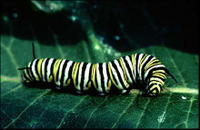 Take the caterpillar, for example. Stroll in your yard and you could quickly spot half a dozen kinds. Spend a little time, and you might find dozens.
Take the caterpillar, for example. Stroll in your yard and you could quickly spot half a dozen kinds. Spend a little time, and you might find dozens.But discovering caterpillars is a lot easier than naming them – or knowing what butterfly they become. And in a world that offers field guides to bird nests, mammal scat, and even roadkill, it’s surprising to learn that someone – in our backyard, almost – has recently written the first caterpillar field guide. UConn Professor David Wagner and his book, Caterpillars of Eastern North America, were profiled in the Aug. 8 New York Times.
Backyard caterpillar study has its advantages. The creatures can’t run or fly away, and you can, with little effort, raise most into their adult forms. You might even contribute to science since, as Dr. Wagner points out, there are moths – including well-known ones – whose caterpillars have never been discovered. It’s great fare for a natural history detective.




